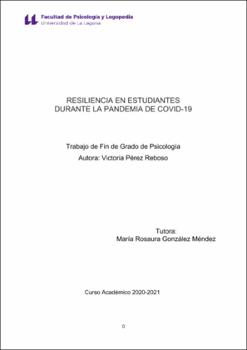Resiliencia en estudiantes durante la pandemia de Covid-19
Autor
Pérez Reboso, VictoriaFecha
2021Resumen
El confinamiento derivado de la pandemia de COVID-19 supuso en España
un cambio total en el estilo de vida de las personas. Dicho período tuvo
consecuencias negativas para los individuos, las comunidades y en general para
las sociedades. Pero ¿Qué influye en que algunas personas sean capaces de
ser “resilientes” en ese período? En este sentido, numerosas investigaciones
hablan del concepto de resiliencia y crecimiento postraumático, pero muy pocas
hacen referencia al crecimiento personal. Por ello, el objetivo de este estudio es
analizar la relación que existe entre las fortalezas: Proyectos y metas,
Optimismo, Introspección y aprendizaje y Apoyo social informal y el indicador de
resiliencia elegido, el Crecimiento personal. Para analizar dicha relación, este
estudio contó con la participación de 147 participantes (89.1% mujeres y 10.9%
hombres) con edades entre los 18 y los 54 años (M= 22.24, DT= 4.6). Los
resultados obtenidos en el estudio confirmaron que, a mayor nivel de fortalezas,
mayor nivel de crecimiento personal. Este resultado es útil para mostrar la
importancia de algunos factores protectores para trabajar en la promoción del
crecimiento personal. The confinement resulting from the COVID-19 pandemic meant a total change
in people's lifestyles in Spain. This period had negative consequences for
individuals, communities and societies in general. But what influences some
people to be able to be "resilient" in that period? In this sense, numerous
researches talk about the concept of resilience and post-traumatic growth, but
very few make reference to personal growth. Therefore, the aim of this study is
to analyze the relationship between the strengths: Projects and Goals, Optimism,
Introspection and Learning and Informal Social Support and the chosen resilience
indicator, Personal Growth. To analyze this relationship, this study involved 147
participants (89.1% female and 10.9% male) aged between 18 and 54 years (M=
22.24, SD= 4.6). The results obtained in the study confirmed that the higher the
level of strengths, the higher the level of personal growth. This result is useful to
show the importance of investigating which protective factors are important in
personal growth in order to be able to work on promoting attitudes that favor them.





